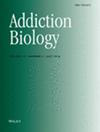4-HIAA Blocks Methamphetamine-Induced Conditioned Place Preference in Mice Through Modulation of the 5-HT Pathway in the Nucleus Accumbens
IF 2.6
3区 医学
Q3 BIOCHEMISTRY & MOLECULAR BIOLOGY
引用次数: 0
Abstract
4-hydroxyindole-3-acetic acid (4-HIAA) is a metabolite of psilocin. Here, we explored the ability of 4-HIAA to cross the blood–brain barrier and its potential effects on methamphetamine (METH)-induced conditioned place preference (CPP) in mice. Treatment with 1-mg/kg 4-HIAA inhibited CPP formation during the acquisition phase, promoted METH extinction and inhibited METH relapse. Furthermore, the regulatory effect of 4-HIAA on METH was underscored by altered 5-HT expression in the nucleus accumbens. Collectively, our findings provide novel insights into the molecular mechanisms of the 4-HIAA-induced blockade of the acquisition, extinction and reinstatement of METH-induced CPP.

4-HIAA通过调节伏隔核5-HT通路阻断甲基苯丙胺诱导的小鼠条件位置偏好
4-羟基吲哚-3-乙酸(4-HIAA)是裸草素的代谢物。在这里,我们探讨了4-HIAA穿过血脑屏障的能力及其对甲基苯丙胺(METH)诱导的小鼠条件位置偏好(CPP)的潜在影响。1 mg/kg 4-HIAA可抑制获取期CPP的形成,促进冰毒消退,抑制冰毒复发。此外,4-HIAA对甲基安非他明的调节作用通过改变伏隔核中5-HT的表达而得到强调。总的来说,我们的研究结果为4- hiaa诱导的阻断甲基甲醚诱导的CPP的获得、消失和恢复的分子机制提供了新的见解。
本文章由计算机程序翻译,如有差异,请以英文原文为准。
求助全文
约1分钟内获得全文
求助全文
来源期刊

Addiction Biology
生物-生化与分子生物学
CiteScore
8.10
自引率
2.90%
发文量
118
审稿时长
6-12 weeks
期刊介绍:
Addiction Biology is focused on neuroscience contributions and it aims to advance our understanding of the action of drugs of abuse and addictive processes. Papers are accepted in both animal experimentation or clinical research. The content is geared towards behavioral, molecular, genetic, biochemical, neuro-biological and pharmacology aspects of these fields.
Addiction Biology includes peer-reviewed original research reports and reviews.
Addiction Biology is published on behalf of the Society for the Study of Addiction to Alcohol and other Drugs (SSA). Members of the Society for the Study of Addiction receive the Journal as part of their annual membership subscription.
 求助内容:
求助内容: 应助结果提醒方式:
应助结果提醒方式:


